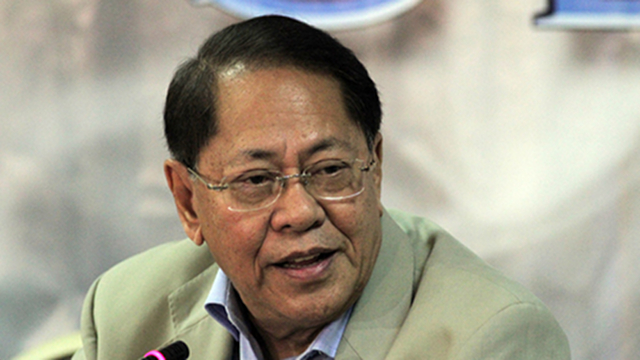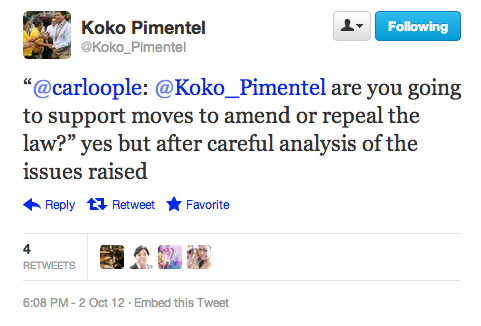SUMMARY
This is AI generated summarization, which may have errors. For context, always refer to the full article.

MANILA, Philippines (3rd UPDATE) – The author and sponsor of the Cybercrime Prevention Act of 2012 said he will file a bill to amend his own law.
As the law takes effect on Wednesday, October 3, Sen Edgardo Angara defended the need for the law but also admitted that it has flaws.
“Put this law in perspective. We are much better off with a law, a [cybercrime] law in operation rather than a cyberspace without one, otherwise, we will be operating in a large, large universe without rules …. But I concede there may have been some omissions, not deliberate, because the cybercrime law is not the product of one, of a single mind.”
“Not all the laws that we pass are perfect. At least in this case we are responsive,” Angara told reporters.
The senator said that among the changes he wants in the amendatory bill is to require the justice department to secure a court order before restricting or blocking access to computer data that prima facie (on the face) violates the law. The law grants the department power to block the data even without a court order.
In the meantime, Angara urged the justice department to suspend the implementation of this so-called takedown clause pending a Supreme Court decision on the issue. There are 9 petitions questioning the constitutionality of the law before the High Court.
“I didn’t put this particular provision,” Angara said. “I’m trying to trace in the record who introduced this kind of provision.”
The lawmaker also said he wants to lower the penalty for violations. The law imposed sanctions one degree higher than those provided for by the Revised Penal Code. Angara said he wants the law to have equal penalties as the Code.
“Bakit naman mas maatas ang penalty? (Why is the penalty higher?) That one, I have a hard time rationalizing in my own mind.”
Yet the senator said the law is still necessary despite widespread criticism and backlash from journalists, bloggers, netizens, academicians, human rights groups and political parties.
“I don’t want the criticism to overwhelm the overall purpose of the law. The proof that we need a law like this is the massive attack on websites of government. Remember this is just government, what about the banks and institutions that will be hacked and penetrated,” Angara said in a mix of English and Filipino.
Several government websites have been hacked, with the hackers claiming this was a form of protest to the law. Justice Secretary Leila de Lima has ordered the National Bureau of Investigation to go after the hackers.
Angara asked the public not to panic. “The fear is self-created.”
‘Why not online libel?’
Angara, however, plans to retain the provision criminalizing online libel.
“Why not? You mean, the cyberspace is a zone of impunity that you can now begin to lambast maliciously your enemies without fear of any sanction at all? I don’t think that would promote our civilization or the use of the Internet.”
In contrast, Sen Francis Escudero filed a separate amendatory bill on online libel on Tuesday, October 2.
Escudero’s bill seeks to repeal the online libel provision. The senator has said this is part of his efforts to decriminalize libel in the Philippines. Instead, he just wants civil liability for the offense, which means there will be no penalty of imprisonment.
Another author of the bill in the Senate, Sen Antonio Trillanes IV, said he is also open to amendments to the law.
“The complaints are multi-sectoral now,” Trillanes said. “We’re willing and open to make amendments,” he added in Filipino and English.
On his Twitter account, another senator who voted for the bill, Aquilino Pimentel III said he is also open to changes.

The lone senator who opposed the bill, Sen Teofisto “TG” Guingona III, said he also plans to file an amendatory bill but intends to crowdsource the needed amendments.
“We will put up a website post amendments and ask everybody who has an idea positive or negative to give their comments. We will crow source amendments to the cybercrime,” Guingona told reporters.
Sen Bongbong Marcos also announced on his Facebook account that he will file a bill to amend the online libel provision, and supports similar efforts.
“The Committee Report that I signed did not contain the Libel Clause. The records will show that when the Libel Clause was introduced and approved on the same day, I was away on ‘official business.’ This is no time to make excuses nor to blame anyone for what I cannot agree to with regards the Libel Clause,” Marcos said.
Marcos added, “It will be a fatal mistake to muzzle our voices in this medium that is the most democratic and empowering to the individual that technology has given to us.”
Sen Loren Legarda, who also voted in favor of the law, said on Twitter she is open to efforts to amend it.
“I welcome moves to immediately revise some contentious provisions of the Cybercrime law while we implement provisions to deter other alarming types of cybercrimes – child pornography, cybersex and computer-related fraud,” Legarda said.
In the House of Representatives, Kabataan Rep Raymond Palatino and Bayan Muna Rep Teddy Casiño also filed an amendatory bill but proposing more changes.
They want to repeal online libel, and the sections punishing those who helped commit a cybercrime, and the takedown clause.
‘We need legal framework’
Angara said as chairperson of the Senate Committee on Science and Technology, he put together the bill but he was just one of several authors including Trillanes, and Senators Manny Villar, Juan Ponce Enrile, and Jinggoy Estrada.
“In the case of the Senate, we created a Technical Working Group, also the DOJ, the NBI, the PNP, the staff of the principal authors …. so many minds worked on this.”
Angara emphasized that a legal framework on cybercrimes is needed in the Philippines.
“We are one of them, countries in Asia Pacific that is a favorite target, a hotspot because we lack the legal framework on the rules. Now, this is an attempt to creating a rules-based, a legal framework on how to expand the use of the Internet without committing any social and economic harm to others,” Angara said.
He added, “What we need is to expand the scope and the use of the Internet because that is the global trend, whether in e-commerce. In the West, e-commerce was already 50% of all Christmas shopping and still rising. We need e-government to make government more effective and efficient.”
In a news conference, Presidential Spokesperson Edwin Lacierda agreed that an anti-cybercrime law is needed.
“We have no legal framework on addressing cybercrimes specifically on certain areas like cybersex, for instance, cybercrime; we have cyber fraud and so this is the background where Senator Angara pushed for the cybercrime [law],” Lacierda said.
Lacierda added, “However, unfortunately, what has been emphasized is the alleged deprivation of freedom of expression.”
The spokesperson said Malacañang posted records of the Senate deliberations on the law to help “clear out” misinformation about it. The Palace has also called for a dialogue on the law. – Rappler.com
| . | More on the Cybercrime Law: |
Add a comment
How does this make you feel?
There are no comments yet. Add your comment to start the conversation.